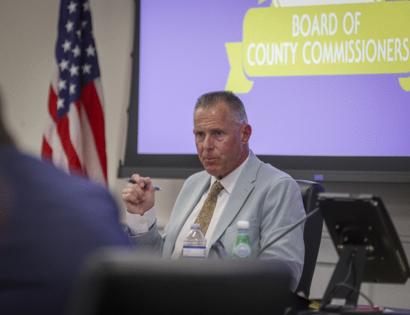John Romano: Rays stadium deal could be built on mutual distrust and antipathy
Published in Baseball
CLEARWATER, Fla. — When trust gets obliterated and respect seems nonexistent, there is only one way to rebuild a deal as delicate and complicated as the plan for the new Rays stadium:
Let’s hear it for spite!
If this stadium ever rises from the parking lots of Tropicana Field — and the odds seem firmly against it — we should all be grateful for the shared dislike between the Rays and the Pinellas County Commission. They’re like siblings antagonizing each other for the sheer sport of it.
One commissioner said during Tuesday’s meeting that she was offended by recent comments made by Rays owner Stuart Sternberg about the commission’s waffling. Another said, “Right now, I don’t like (Sternberg) a whole lot.” And they were the ones who helped keep the deal alive.
The three commissioners in the Rays camp (Rene Flowers, Kathleen Peters and Brian Scott) seem to be there grudgingly. And the Rays themselves appear to be going through the motions only to be in position to claim the high ground, and redevelopment rights, if this thing falls apart.
So, how did we get here less than four months after prematurely celebrating the deal’s conclusion?
I’m skipping over a million or so details, but the basic timeline looks like this:
— Step 1: A pair of hurricanes blow through and upend the lives of thousands of residents, along with tearing the roof off Tropicana Field.
— Step 2: The commission opts to postpone a vote to issue bonds to pay for the county’s portion of the new stadium, a detail that was thought to be a formality. Ostensibly, this was done in deference to hurricane damage, but the realistic outcome is that it extended the bond vote beyond a November election that ended up changing the makeup and disposition of the commission.
— Step 3: The Rays say the uncertainty of the new commission lineup forced them to halt construction plans, which means the stadium’s opening would likely be in 2029 instead of 2028. This is significant, because the Rays are responsible for all cost overruns and a one-year delay could mean a hefty price increase in construction. Not to mention the lost revenues from playing in a temporary ballpark while the Trop is (supposedly) repaired.
The upshot of all that?
The new commission is much less Rays-friendly, and the Rays are ticked off that the commission’s reluctance may have cost them hundreds of millions of dollars.
All of which led to Tuesday’s cluster of a meeting where no one was willing to say the deal for the stadium was kaput but they all lined up to accuse each other of killing it.
The Rays began the festivities with a letter sent to commission members a couple of hours before the meeting. The letter was meant to explain the team’s stance but ended up alienating most of the commission. Adding to the surrealism, team presidents Brian Auld and Matt Silverman accepted the commission’s invitation to attend the meeting but declined to answer questions, which had a Fifth Amendment-like effect.
Had the commission voted to approve/deny the issuance of bonds on Tuesday, it surely would have died. So, commissioner Brian Scott, who was clearly annoyed with the Rays but believes in the economic impact of the stadium and the Historic Gas Plant redevelopment, pushed to have the vote delayed until December.
Does Scott believe the one-month reprieve will change anything?
“At this moment, I’m not really optimistic about it,” Scott said. “But we’ve got to remain hopeful. Got to remain hopeful.”
There are no legal ramifications for the county if it decides not to honor its original July vote to put up $312 million toward the stadium’s $1.3 billion — and apparently growing — cost. But there could be some serious implications that Peters feared would affect the county’s tax base for decades to come.
The pact to build the stadium is separate from another deal the Rays have with St. Petersburg to redevelop the 69 or so acres that would surround the stadium. And, as long as the Rays meet certain criteria over the coming months, it appears they would retain the right to develop that land even without a ballpark. Peters feared the Rays would no longer be motivated to make the Historic Gas Plant a community asset as much as a cash cow for the developers.
“I’m sure that if we don’t fund this and they’re no longer accountable for that stadium, they’re going to take that 60 acres and they’re going to make a bunch of money and they’re not going to make it look and live like what they promised,” Peters said. “Because it won’t be the entertainment hub without the stadium.
“They can put together this entertainment hub that is an incredible destination, but you take that main component away, then you lose the possibility.”
Based on their comments during Tuesday’s meeting, commissioners Chris Latvala and Vince Nowicki seem firmly against issuing the bonds. Dave Eggers also appears to be a hard no, although he expressed a willingness to talk to the Rays.
That could leave new commissioner Chris Scherer as the best hope for the future of Major League Baseball in Tampa Bay. Scherer spoke against the stadium plan during the meeting on Tuesday but, afterward, said he would be happy to meet with the Rays and hear their point of view.
“I’m not against this deal; I’m not for this deal,” Scherer said. “I want to make a good, sound financial decision for the people of Pinellas County.”
____
©2024 Tampa Bay Times. Visit tampabay.com. Distributed by Tribune Content Agency, LLC.







Comments